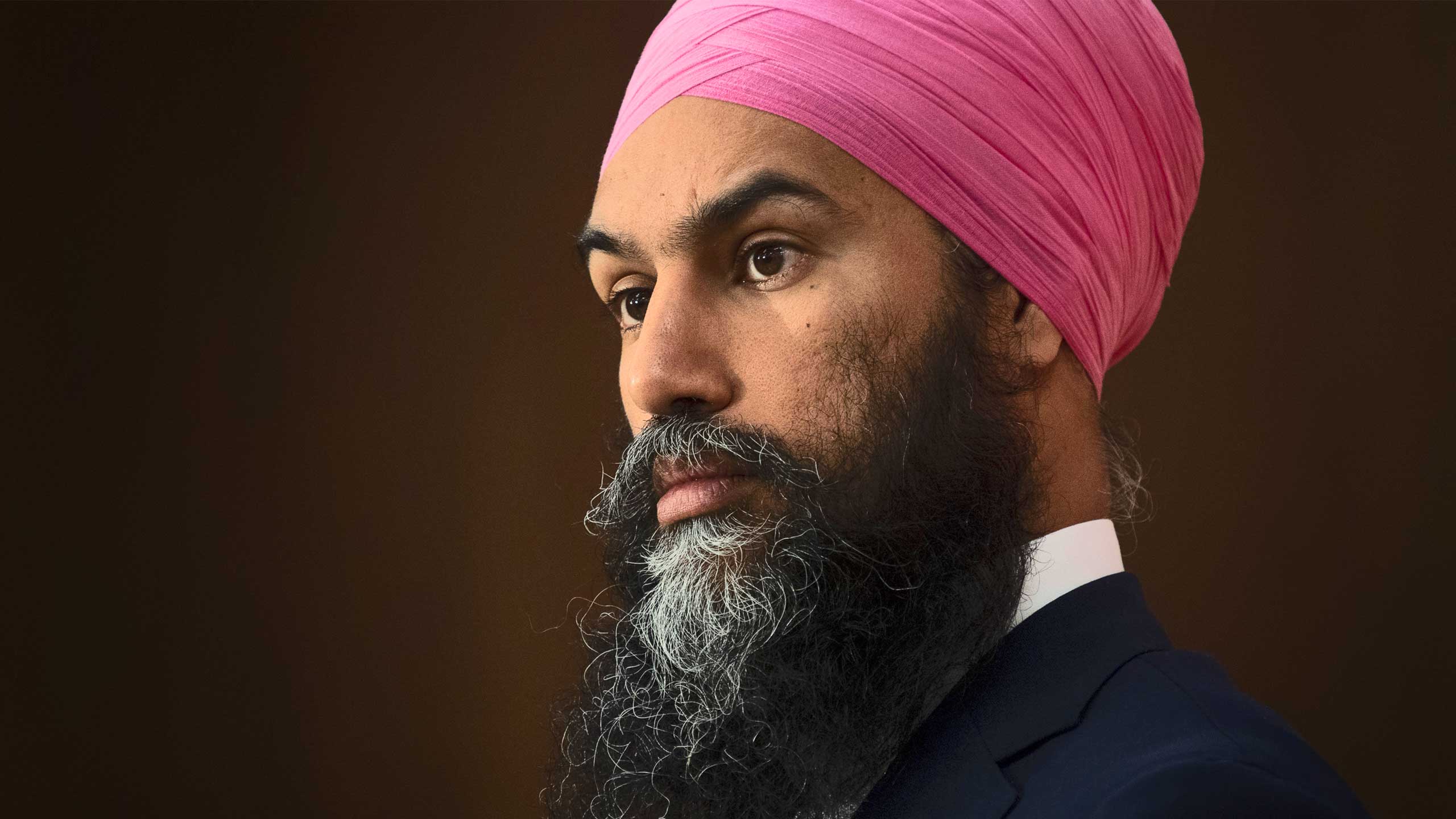When Jagmeet Singh became leader of the New Democratic Party in 2017, he began a new era in Canadian politics. Singh, then 38 years old, was the first person of colour to lead a major Canadian political party. He looked and sounded nothing like his predecessor, Tom Mulcair, and he wouldn’t emulate the party’s previous campaigns, or borrow from the same playbook. Singh brought a new sensibility to the party: young, charismatic, in touch with issues the country’s youngest voters knew intimately. But in 2019, that wasn’t enough to win seats against Justin Trudeau’s Liberals, and Singh’s NDP watched support drop across the country.
This time around, after a global pandemic and racial reckonings that have reverberated throughout the country, Singh is certain he can lead a progressive Canada. He’s still fighting for the youth vote—and yes, that means being on TikTok. He doesn’t shy away from issues of marginalization and discrimination. And he wants the next Parliament to look like Canada: diverse.
To learn more about his position on LGBTQ2S+ issues, Singh spoke to Xtra senior editor Erica Lenti on the phone from his campaign bus on Aug. 25.
As the campaign kicked off, you issued a press release about Bill C-6, noting that because Liberal leader Justin Trudeau called a snap election, conversion therapy is not going to be banned across the country. What will the NDP do differently to ensure that LGBTQ2S+ Canadians are going to be protected from conversion therapy?
I just want to say how unfair this has been for the community, given that the first time this bill was before Parliament, on its way to being passed, all the work that was done was restarted because the Liberals prorogued Parliament. The second time, we made some progress moving along, and then Trudeau called the election, jeopardizing the bill. We said that if it’s something that will help Canadians, any initiative that is in the interest of Canadians, we’ll speed it up or pass it, we’ll be there. And to me, that’s cynical politics, and I’m not about that type of politics; I’m about getting things done. I want results. I want to see change, and I want to ban conversion therapy. There’s no reason why this practice, which is so hurtful and harmful, should be continuing in Canada.
If the NDP forms government, can you commit that this will be one of your top priorities?
Absolutely. There is no reason for it to be delayed. It doesn’t require any delay. There’s no negotiation with provinces, where other [bills] might require some time. There’s really no justification that this would take any time at all. So this can be done quickly.
“It’s the heroic stories of people who have gone through it that gives us the additional motivation to ban conversion therapy.”
Many survivors say they have been fighting to be centred in the way this policy comes into practice. Would the NDP work with survivors of conversion therapy to make this better legislation?
What makes this ban so important is that we have examples of people that went through this so-called “therapy.” It’s been harmful, and people have stories about why it’s harmful. It’s largely the heroic stories of people who have gone through it, who are sharing their stories, that gives us the additional motivation—if we needed it—to do it. We have people who have lived it and then can share with us how much it hurts and how harmful it is.
There has been a lot of criticism from trans and gender nonconforming communities about Bill C-6, who say the bill didn’t adequately address conversion therapy that targets gender identity specifically. How will the NDP work to address this in the next iteration of the bill?
It’s a really fair point. While there’s some obvious elements that were addressed, there’s still more that can be done and so we would be open to making sure it’s a ban on conversion therapy in terms of banning all harmful practices. So I’m open to working with the queer community, working with the the Two-Spirit, LGBTQ community to figure out what else is included.
The NDP has committed to ending the blood ban for queer men and trans women. Can you tell me what meaningful steps your party will take to make that a reality?
Just getting it done. This is something that perpetuates homophobia. It has no basis at all in science, and there’s no reason for it to exist. It’s not based in what is going to keep people safe.
Just earlier today, I met two young women and asked them what their biggest concern was. They said, “gay rights, queer rights.” And I said, “What particularly?” and they were just saying, “Well, homophobia is still a big deal, and it still exists.” And this is their lived experiences, that it’s still a problem, being accepted. And [the blood ban] is just another example of something that’s held out to be scientific, and that gives it some legitimacy. And it just perpetuates a stereotype. And that’s wrong.
In your platform, your party has committed to helping improve access to trans health care. Can you elaborate on how the NDP is going to work with the provinces and territories to assure that trans and gender nonconforming people have access, particularly with regards to medications and gender-confirmation surgeries?
This should be considered a part of our health care system. These are rights that people should have access to. Generally speaking, we want to make sure that these rights are respected, and that we use the Canada Health Act principles to protect those rights.
And then more specifically, around things like medication coverage, this harkens back to why it’s so important to have medication coverage for all, because it speaks to people in many different ways. It speaks to people who are dealing with chronic illness, but it also would support trans people. It would also support women when it comes to protecting their reproductive rights. So there’s so many areas where pharmacare is so important. But this is another example of a specific way that having medication coverage would help.
“We have a role to play in helping folks that are being persecuted to be able to escape that persecution.”
The NDP platform also commits to a permanent path for resettlement for LGBTQ2S+ refugees. With what’s happening in Afghanistan right now, we are seeing an even greater need for that. Can you explain how your party is going to make this possible?
We believe strongly that Canada has been a refuge for people fleeing persecution around the world, and we’re proud of that. One of the ways we can do our part is to acknowledge that people flee real danger in their lives because of their sexual identity and their gender identity and expression. We need to make sure that that is a strong part of our humanitarian approach to immigration and for refugees—for people who are fleeing persecution in countries where it’s illegal to be who they are, or who are being threatened with violence because of where they are. We have a role to play in helping folks that are being persecuted like that be able to escape that persecution.
Will resettling queer and trans refugees be a priority for the NDP?
Absolutely. When we look at our immigration system, we look at people facing threat. It’s one of our pillars already, that we have humanitarian grounds based [for] people that are in fear [for] their lives because of political beliefs or because of their activities or civic engagement. Similarly, this should be a pillar—that people who are being targeted because of who they are should be able to find refuge and protection in Canada. That’s what we’re known for. People are proud of that. And we should continue to be able to do that.
Here in Canada, there’s a massive housing crisis, and we know that LGBTQ2S+ youth are among the most precariously housed. How will the NDP address this housing crisis, specifically when it comes to queer and trans youth?
Any time there’s a crisis, the most marginalized are the hardest impacted. So if we have a problem with access to health care, we will often find that the data will show that it’s the people who are most marginalized—whether by their socio-economic [status], their gender identity, race, their ethnicity—that contribute to the disproportionate impact anytime there’s an inequality, or there’s a crisis. So our broad commitments to tackling the housing crisis will then help people who have been hardest hit.
In our housing plan, we speak of specific housing that meets the needs of people with nonconforming genders, or people from the queer community, the LGBTQ community. We need to make sure that our housing solution to the crisis responds to the needs of the community. And that includes being able to respond to all communities and all their needs.
“Any time there’s a crisis, the most marginalized are the hardest impacted.”
The NDP platform also specifically references the importance of honouring Indigenous women and girls and Two-Spirit people, calling for reconciliation and justice. Can you speak to how your party will actionably be honouring these communities? And what will be your first priority with regards to improving the lives of Indigenous women and girls and Two-Spirit people?
We have a very strong guideline or a vision around how we can do that, and that’s the Calls [for] Justice from the National Inquiry into Murdered and Missing Indigenous Women and Girls. It lays out a course of action for us to concretely protect against the violence that is so prevalent against Indigenous women and girls and Two-Spirit people. So that’s, for me, a really strong guiding light: let’s implement those Calls [for] Justice, let’s look at those specific demands made by the Indigenous community in response to the fact that Indigenous women are disproportionately killed and targeted. The Indigenous community has worked on a solution—we should honour that and implement it.
Why does LGBTQ2S+ representation in your party matter to you? How are you helping to support LGBTQ2S+ candidates running in your party?
This is something that speaks to me as someone who didn’t really see myself reflected in politics. Seeing people who look like me or share my story made me feel more welcomed. When you see yourself reflected in the halls of power, you believe that you deserve to be there. And that’s why representation matters.
It also helps to make better decisions. When someone [who] has lived experience understands what it’s like to be facing barriers because of one’s sexuality or gender expression, then you can fight the problems better. You can solve the problems better because you’re coming from a position of understanding them in a really intimate and personal way. The more representation we have, the better. And really, the people who represent the country should look like the country and should reflect all the diversity of the country.
This interview has been edited for length and clarity.


 Why you can trust Xtra
Why you can trust Xtra


